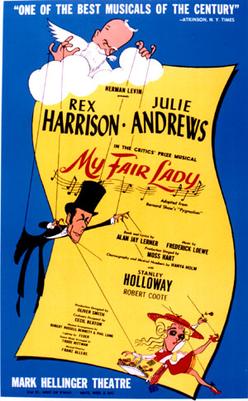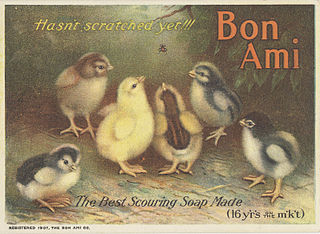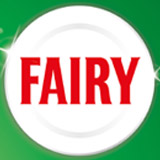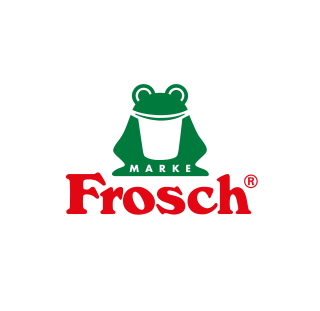
Monkey Brand soap was introduced in the 1880s in cake/bar form in the United States and United Kingdom as a household scouring and polishing soap.

Monkey Brand soap was introduced in the 1880s in cake/bar form in the United States and United Kingdom as a household scouring and polishing soap.
Initially, Benjamin Brooke & Co Ltd, a firm owned by Sidney and Henry Gross, had produced the soap in Philadelphia. [1] The soap's highly abrasive [2] agent was probably pumice. [3]
Lever Brothers bought the company in January 1899 [4] and transferred the production of Monkey Brand soap to Port Sunlight near Liverpool. The name ‘Benjamin Brooke’ (hence Brooke's Monkey Brand) was retained to promote the Monkey Brand soap on both sides of the Atlantic.
In George Bernard Shaw's Pygmalion and the musical based on it ( My Fair Lady ), Henry Higgins tells his housekeeper to take Eliza Doolittle upstairs and clean her up, and to use "...Monkey Brand, if it won't come off any other way" (Act II). [5] In the movie version, the line is changed to "...sandpaper, if it won't come off any other way." In Beatrix Potter's 1912 novel The Tale of Mr Tod , Mr Tod mentioned Monkey Soap as one of the soaps needed for cleaning his bedding.
The advertising campaign for Monkey Brand soap was used by cultural historians for analyzing Victorian values and social attitudes at the intersection of race, gender and class. [6]

Advertising is the practice and techniques employed to bring attention to a product or service. Advertising aims to put a product or service in the spotlight in hopes of drawing it attention from consumers. It is typically used to promote a specific good or service, but there are wide range of uses, the most common being the commercial advertisement.

My Fair Lady is a musical based on George Bernard Shaw's 1913 play Pygmalion, with a book and lyrics by Alan Jay Lerner and music by Frederick Loewe. The story concerns Eliza Doolittle, a Cockney flower girl who takes speech lessons from professor Henry Higgins, a phonetician, so that she may pass as a lady. Despite his cynical nature and difficulty understanding women, Higgins grows attached to her.

Soap is a salt of a fatty acid used in a variety of cleansing and lubricating products. In a domestic setting, soaps are surfactants usually used for washing, bathing, and other types of housekeeping. In industrial settings, soaps are used as thickeners, components of some lubricants, and precursors to catalysts.

Sex appeal is often used in advertising to help sell a particular product or service. According to research, sexually appealing content, such as imagery, used for marketing does not need to pertain directly to the product or service in question. Rather, such content is utilized as an attempt to shape or shift brand image held by the consumer. As more companies have adopted the ad strategy of "sex sells", the prevalence of sexual campaigns has led to controversy. Consumers in society have voiced concern over the techniques and content used for titillating audiences, often stemming from the fact that such ads challenge conventional morals and cultural standards.

Unilever plc is a British multinational consumer goods company with headquarters in London, England. Unilever products include food, condiments, bottled water, baby food, soft drink, ice cream, instant coffee, cleaning agents, energy drink, toothpaste, pet food, pharmaceutical and consumer healthcare products, tea, breakfast cereals, beauty products, and personal care. Unilever is the largest producer of soap in the world and its products are available in around 190 countries.

Tango is a soft drink originating, and primarily sold, in the United Kingdom and Ireland. It was first launched by Corona in 1950. Corona was purchased by the Beecham Group in 1958, and Corona Soft Drinks by Britvic in 1987.

Monkey, is an animated puppet advertising character in the form of a knitted sock monkey. He was first produced by The Jim Henson Company via their UK Creature Shop, puppeteered by Nigel Plaskitt and Susan Beattie and voiced by comedian Ben Miller.

PG Tips is a brand of tea in the United Kingdom manufactured by Ekaterra.
Ivory is a flagship personal care brand created by the Procter & Gamble Company (P&G), including varieties of white and mildly scented bar soap that became famous for its claim of purity and for floating on water. Over the years, the brand has been extended to other varieties and products.

'Bon Ami' is a brand of scouring powder sold by the Bon Ami Company of Kansas City, Missouri. Since its inception in the late 19th century, the brand's advertising campaigns have gained particular notice.

In Greek mythology, Pygmalion was a legendary figure of Cyprus, who was a king and a sculptor. He is most familiar from Ovid's narrative poem Metamorphoses, in which Pygmalion was a sculptor who fell in love with a statue he had carved.

Fairy is an international brand, primarily used for washing up liquid and dishwasher detergent, owned by the American multinational consumer products company, Procter & Gamble. The brand originated in the United Kingdom and is now used on a number of P&G products in various markets.

Henkel Corporation, doing business as Henkel North American Consumer Goods, and formerly The Dial Corporation, is an American company based in Stamford, Connecticut. It is a manufacturer of personal care and household cleaning products, and is a subsidiary of the German company Henkel AG & Co. KGaA.
Lorraine Chase is an English actress and former model. She became well known for her strong south east London accent and frequent use of cockney slang, and found fame through a series of television adverts for Campari before embarking on an acting career. She is best known for playing the role of Steph Stokes in ITV soap opera Emmerdale from 2002 to 2006, with a brief return in 2013. Her partner, John Knight, died from cancer in 1996.

Pygmalion is a 1938 British film based on the 1913 George Bernard Shaw play of the same name, and adapted by him for the screen. It stars Leslie Howard as Professor Henry Higgins and Wendy Hiller as Eliza Doolittle.

Imperial Leather is a brand of soaps, toiletries and healthcare products manufactured by PZ Cussons. The brand originates in Britain and is now available in a number of other countries including Australia, Denmark, Germany, Hong Kong, India, Indonesia, Iran, Ireland, Kenya, Malawi, Malta, Nepal, New Zealand, Pakistan, South Africa, Uganda, the United Arab Emirates and Zambia. The brand is not widely available in the United States but can be obtained via online sales and in some speciality shops.

Compare the Meerkat is an advertising campaign on British and Australian commercial television for comparethemarket.com, a price comparison website, part of BGL Group. The adverts feature Aleksandr Orlov, a CGI anthropomorphic Russian meerkat and his family and friends. Orlov is portrayed as being of aristocratic stock and the founder of comparethemeerkat.com: the campaign originally centred on his frustration over the confusion between his website and comparethemarket.com, playing on the similarity between the words market and meerkat. Orlov's catchphrase is "Simples".
Metamorphoses (Transformations) is a Latin narrative poem by the Roman poet Ovid, considered his magnum opus. Comprising fifteen books and over 250 myths, the poem chronicles the history of the world from its creation to the deification of Julius Caesar within a loose mythico-historical framework. Although meeting the criteria for an epic, the poem defies simple genre classification by its use of varying themes and tones.

Frosch is a trademark for cleaning and care agents made by the Mainz-based company Werner & Mertz GmbH. Introduced in 1986, the brand family comprises over 80 products, including multi-purpose cleaning agents, scouring agents, glass cleaners, special cleaners, toilet cleaners, dish-washing liquid and laundry detergents. Hand soaps, shower gel and air fresheners are new additions to the portfolio. By launching Frosch, the company complemented its current product portfolio by adding a brand with a clear focus on ecological aspects in addition to efficiency. The brand is the company's largest source of revenue. Werner & Mertz also engages in sustainability drives under its own name. Surveys by Reader's Digest indicate that Frosch is – from a consumer perspective – among the most trustworthy brands. Werner & Mertz generated revenues of €455 million in 2019 and is forecast to reach €525 million in 2020.
Amanda Bintu Holiday is a Sierra Leonean-British artist, filmmaker and poet.